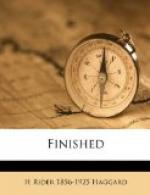I wondered if it would be worth while to make him quite drunk and then attempt to escape on the horse, but gave up the idea. To begin with, his men were at hand and there was not enough brandy to make them all drunk. Also even if I succeeded in winning away here in the heart of Zululand, it would not help Anscombe or Heda and I should probably be cut off and killed before I could get out of the country. So I abandoned the plan and went to sleep instead.
Next morning we left Nongoma early in the hope of reaching Ulundi that evening if the Ivuna and Black Umfolozi Rivers proved fordable. As it chanced, although they were high, we were able to cross them, I seated on the horse which two of the Zulus led. Next we tramped for miles through the terrible Bekameezi Valley, a hot and desolate place which the Zulus swear is haunted. So unhealthy is this valley, which is the home of large game, that whole kraals full of people who have tried to cultivate the rich land, have died in it of fever, or fled away leaving their crops unreaped. Now no man dwells there. After this we climbed a terrible mount to the high land of Mahlabatini, and having eaten, pushed on once more.
At length we sighted the great hill-encircled plain of Ulundi which may be called the cradle of the Zulu race as, politically speaking, it was destined to be its coffin. On the ridge to the west once stood the Nobamba kraal where dwelt Senzangacona, the father of Chaka the Lion. Nearer to the White Umfolozi was Panda’s dwelling-place, Nodwengu, which once I knew so well, while on the slope of the hills of the north-east stood the town of Ulundi in which Cetewayo dwelt, bathed in the lights of sunset.
Indeed it and all the vast plain were red as though with blood, red as they were destined to be on the coming day of the last battle of the Zulus.
CHAPTER XIII
CETEWAYO
It was dark when at last we reached the Ulundi kraal, for the growing moon was obscured by clouds. Therefore I could see nothing and was only aware, by the sound of voices and the continual challenging, that we were passing through great numbers of men. At length we were admitted at the eastern gate and I was taken to a hut where I at once flung myself down to sleep, being so weary that I could not attempt to eat. Next morning as I was finishing my breakfast in the little fenced courtyard of this guest-hut, Goza appeared and said that the king commanded me to be brought to him at once, adding that I must “speak softly” to him, as he was “very angry.”
So off we went across the great cattle kraal where a regiment of young men, two thousand strong or so, were drilling with a fierce intensity which showed they knew that they were out for more than exercise. About the sides of the kraal also stood hundreds of soldiers, all of them talking and, it seemed to me, excited, for they stamped upon the ground and even jumped into the air to give point to their arguments. Suddenly some of them caught sight of me, whereon a tall, truculent fellow called out—




